The Unfinished Cold War
This November will mark the twentieth anniversary of the fall of the Berlin Wall. But, although the Cold War in Europe was declared over, the truth is, it never really finished, and today old divisions seem to be re-emerging in a different form.
MOSCOW – This November will mark the twentieth anniversary of the fall of the Berlin Wall. But the end of confrontation in Europe may be proving only temporary. One year after last summer’s war in Georgia, old divisions seem to be re-emerging in a different form. Although the Cold War in Europe was declared over, the truth is, it never really finished.
When the Soviet Union withdrew from Central and Eastern Europe, we Russians believed that NATO would not be extended to the countries and territories from which we had withdrawn. Our hope was for unification with Europe, a “common European home,” and the creation of a Europe “united and free.” Our hopes were not starry-eyed self-deception. After all, the leaders of the United States and Germany had promised Mikhail Gorbachev that NATO would not expand eastward.
At first, after they had vanquished communism, Russians regarded themselves as victors. But, after a few euphoric years, the West began acting more and more like the Cold War’s winners. Once the potential “military threat” posed by the Soviet Union had vanished into thin air, successive waves of NATO enlargement served neither a military nor an ideological purpose.



MOSCOW – This November will mark the twentieth anniversary of the fall of the Berlin Wall. But the end of confrontation in Europe may be proving only temporary. One year after last summer’s war in Georgia, old divisions seem to be re-emerging in a different form. Although the Cold War in Europe was declared over, the truth is, it never really finished.
When the Soviet Union withdrew from Central and Eastern Europe, we Russians believed that NATO would not be extended to the countries and territories from which we had withdrawn. Our hope was for unification with Europe, a “common European home,” and the creation of a Europe “united and free.” Our hopes were not starry-eyed self-deception. After all, the leaders of the United States and Germany had promised Mikhail Gorbachev that NATO would not expand eastward.
At first, after they had vanquished communism, Russians regarded themselves as victors. But, after a few euphoric years, the West began acting more and more like the Cold War’s winners. Once the potential “military threat” posed by the Soviet Union had vanished into thin air, successive waves of NATO enlargement served neither a military nor an ideological purpose.